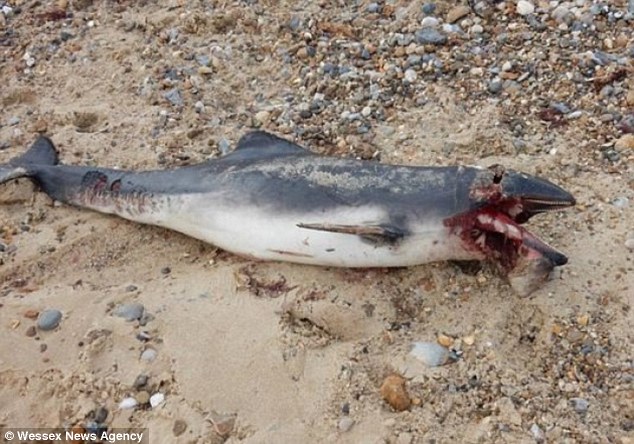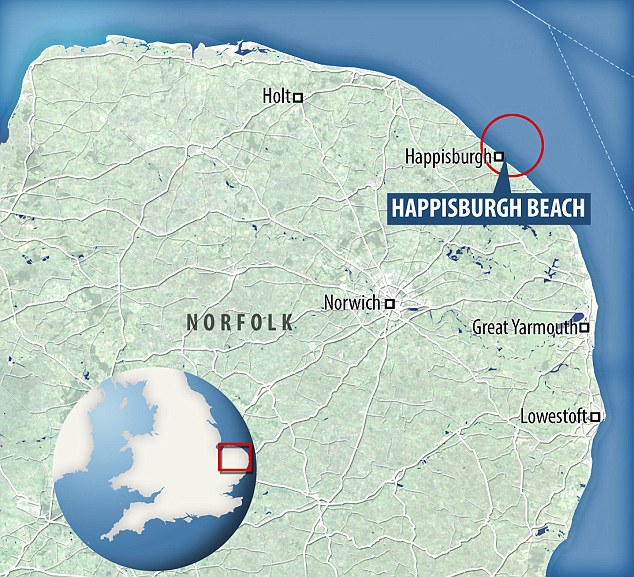Fears are growing that a great white shark could be on the prowl at a popular British holiday beach after a mutilated porpoise washed up ashore.
The 5ft long dead animal appeared at Happisburgh, Norfolk, with tell-tale chunks of flesh torn from round its mouth.
The ripped flesh could have come from it fighting desperately to fend off a huge predator.

This porpoise washed up on a Norfolk beach prompting fears that it could have been attacked by a Great White shark
The 5ft long dead animal washed ashore at Happisburgh, Norfolk, with tell-tale chunks of flesh torn from round its mouth
There have been previous incidents where mutilated porpoises have washed up on British beaches with bite marks in their flesh, with experts at the time claiming such injuries were ‘almost certainly,’ caused by a shark.
A resident, who wishes to remain anonymous, and who lives near to the scene said: ‘We’ve heard about this latest porpoise being washed up at Happisburg and it’s not far from where the porpoises came ashore with what looked like bite marks in 2011, so of course people are worried there is something out there that’s doing it.
‘The experts said in 2011 that they thought it might be a great white shark or even a killer whale, so we’re all a bit nervous, specially with the holiday season coming up when the beaches will be packed.
‘Everyone’s praying they will examine the porpoise and say it’s not a shark attack – for the sake of the local tourist industry if nothing else.’
At first terrified beachcombers even thought it was a shark on the beach at Happisburgh, and panic-stricken messages were posted on social media.
The mutilated corpse was quickly identified as a harmless harbour porpoise, but now there are fears it died after being attacked by a great white lurking in shallow water along the coast, which has many holiday beaches.
It has raised fears that a great white, which grow to over 20ft, or even an orca killer whale, which can top 30ft, has set up home in the area, seeking the warmth of deeper water in the winter months and coming closer to the shore as temperatures soar in the spring sunshine.
The great white could even be making the area its permanent home – in 2011, two porpoises washed up on Winterton beach, near Great Yarmouth, with bite marks in their flesh.
Linzi Smith, 29, and fiancé Steve Hunt, 36, found one of the chewed-up porpoises and marine experts said at the time that the savage bite marks meant it almost certainly had been attacked and killed by a huge shark or killer whale.

Could a shark be prowling the waters off the Norfolk coast after a mutilated porpoise washed up?
The dead porpoise on the beach. In 2011 there were several sightings of mutilated porpoise on the UK coast

This is where the porpoise washed up on the beach at Happisburgh. Not far down the coast is the scene of the 2011 sightings of dead porpoises at Great Yarmouth
The couple made their gruesome find just days after walker Hollie Moran, 24, found another 5ft porpoise with chunks taken out of its head and tail on the beach two miles away at Horsey.
Chillingly, the 2011 victims were killed in April and the new find was this week – in the first few days of May – is the time when large predators traditionally start moving from the deep ocean to shallow coastal waters which become full of small ‘prey’ fish as the weather warms up.
When the two porpoises washed ashore in 2011, Dr Ken Collins of the National Oceanography Centre in Southampton said they had ‘undoubtedly’ suffered shark bites. He added ‘It could be a great white. The sea around the UK is habitable for big sharks.’
Norfolk naturalist Percy Trett said he believed a killer whale was the more likely explanation.
Happisburgh beach, Norfolk. Experts believe sharks could be seeking the warmth of deeper water and coming closer to the shore as temperatures soar in the spring sunshine
‘Killer whales do occur off the Scottish coast and occasionally come down the North Sea. They will attack porpoises and seals,’ he warned.
The porpoise deaths followed a string of mystery deaths of seals which suffered ugly injuries off the Norfolk coast in 2010.
As news spread on social media about the latest dead porpoise washed ashore this week, many panic-stricken holidaymakers thought twice about going into the water.
Photos of the 5ft long porpoise, sporting rows of jagged teeth have been shared on social media.
This prompted residents near the beach at Happisburgh to rush out to look for the tell-tale fins of sharks cleaving the surface.
However Mike Price, assistant curator of fishes at SeaWorld San Diego, believes it is unlikely to be an attack from a great white.
Speaking to MailOnline Travel, he said: ‘It’s very hard to give an accurate diagnosis without seeing the specimen first-hand but, based on these images alone, I think it’s very unlikely that this porpoise was attacked by a great white shark.
‘It would be more likely to be another species of shark as if it was a great white I would expect the head to be removed from the body completely.
‘I would also guess that this particular porpoise was bitten when it was already dead – this particular species is very fast and agile in the water and it would be extremely difficult for a predator to cause this kind of damage when it was alive.’
Leave a Reply
You must be logged in to post a comment.